|
Section 18 of the Sexual Harassment of Women at Workplace (Prevention, Prohibition, and Redressal) Act, 2013 deals with the right of an aggrieved person to file an appeal in case they are dissatisfied with the recommendations made in their case or if the recommendations have not been implemented.
A detailed understanding is as below: Sub-section 1:Any person aggrieved from the recommendations made under sub-section (2) of section 13 or under clause (i) or clause (ii) of sub-section (3) of section 13 or sub-section (1) or subsection (2) of section 14 or section 17 or non-implementation of such recommendations may prefer an appeal to the court or tribunal in accordance with the provisions of the service rules applicable to the said person or where no such service rules exist then, without prejudice to provisions contained in any other law for the time being in force, the person aggrieved may prefer an appeal in such manner as may be prescribed.
0 Comments
He and she attended a company-nominated training program outside the company premises. After the training program, she complained to the ICC that he sexually harassed her during the training program. Is this complaint valid under the Sexual Harassment of Women at Workplace (Prevention, Prohibition, and Redressal) Act, 2013?
YES. The incident took place during a training program, and according to the Act, the venue of the training program is the workplace. The Prevention, Prohibition, and Redressal (PPR) approach is a key feature of the POSH Act, 2013. This approach aims to create safe and harassment-free workplaces for women.
Prevention: It refers to the steps taken by the employer to prevent sexual harassment in the workplace. Employers must take measures such as establishing internal committees, conducting awareness and sensitization programs and implementing policies and guidelines to prevent sexual harassment in the workplace. Prohibition: This refers to the prohibition of sexual harassment in the workplace. Here, prohibition is strictly related to restricting unwelcoming acts/behaviors in the workplace related to sexual harassment. Employers must communicate such restrictions through policy, process, and awareness programs. They must ensure that their employees, including visitors, are aware of such prohibitions. Redressal: This refers to the mechanisms put in place to address and redress complaints of sexual harassment in the workplace. Employers are required to establish internal committees to address sexual harassment complaints, and employees have the right to file complaints with the committee if they experience any form of sexual harassment. What kinds of harassment are illegal as per POSH Act, 2013?
The Prevention of Sexual Harassment at Workplace Act, 2013 (POSH Act) defines Sexual Harassment as any unwelcome acts or behavior, whether directly or by implication. In line with this, the following acts are considered illegal:
The wife & husband work in the same company and are allowed to work from home from 8:00 am to 5:00 pm. They took financial benefit from the company to buy the required furniture to work from home. After a few days, the wife complained to ICC that her husband had sexually harassed her during working hours. Is this complaint valid under the Sexual Harassment of Women at Workplace (Prevention, Prohibition, and Redressal) Act, 2013?
YES As per POSH Act 2013, we have an excellent POSH policy and constituted an IC Committee. As we meet these requirements, we do not have time to provide POSH training to employees due to production pressure. Is this okay?
No, it is not okay. As per the POSH Act 2013, every employer must provide awareness through training programs at regular intervals for all employees (including contract labour & trainees) on the prevention of sexual harassment. Such programs must sensitize the employees to the provisions of the Act. The POSH awareness sessions must cover the following:
Can inappropriate behavior occurring outside of the factory premises still be considered a violation of the POSH Act?
Yes. The inappropriate behavior that occurs outside the workplace but has a nexus to the workplace can still be considered a violation of the POSH Act. As per section 2 (o) (v) of the Act, the workplace includes: any place visited by the employee arising out of or during the course of employment including transportation by the employer for undertaking such journey. In line with this, if a woman employee is subjected to inappropriate behavior by a co-worker, supervisor, or customer during a work-related event or on work-related travel, it will be considered a violation of the POSH Act. Can a person file a complaint of sexual harassment anonymously under POSH?
Yes. The POSH Act allows a person to file a complaint of sexual harassment anonymously. The act allows this to protect the identity of the person making the complaint. This can help the complainant to feel more secure in making the complaint, especially in cases where the complainant may be concerned about victimization. Anonymity can also encourage more people to come forward and report incidents of sexual harassment, which can help to create a safer and more respectful workplace for everyone. The POSH Act recognizes the need for confidentiality in such cases, and complainants have the option to request the ICC not to reveal their identity during the inquiry. However, it is essential to note that submitting an anonymous complaint may affect the credibility of the complaint and investigation. This may limit the ICC's ability to gather evidence and conduct a thorough investigation. In our company, we have ten male employees and no female employees. Is it necessary to constitute an Internal Committee under the POSH Act, 2013?
→Yes. →If a workplace does not have any female employees, it is still necessary to constitute an Internal Committee (IC) under the Prevention of Sexual Harassment (POSH) Act, 2013. →The POSH Act mandates that every workplace with ten or more employees, regardless of gender composition, must establish an IC to address and prevent sexual harassment in the workplace. The aggrieved woman requested the Internal Committee (IC) of POSH to allow Advocate to represent in the inquiry process. Is this valid?
→NO. →As per the POSH Act, 2013, both the parties to the complaint are not permitted to bring their Advocates/Legal Practitioners to participate in the IC Inquiry Process. The Company formed the Internal Complaints Committee (ICC) to meet the requirements of the POSH Act - 2013, but it did not include an external member. In this situation, is the committee valid?
NO. As per the POSH Act of 2013, every ICC must include at least one external member who is not associated with the organization or does not work in the same industry. A supervisor complains to HR that one of the female team members is often idle in her workstation without performing the assigned tasks. HR asked him to provide proof for the same. To provide evidence, the supervisor took a photo of the female team member while she was not working at her workstation. The female team member objected to the supervisor's act and reported as sexual harassment to the IC. Is it valid?
→The complaint is not valid as the POSH Act, 2013 defines sexual harassment as any unwelcome physical, verbal, or non-verbal conduct of a sexual nature that could create an intimidating, hostile, or offensive work environment. →The points because the complaint is not valid are:
Can ICC forward sexual harassment complaint to the police without the consent of the aggrieved woman?
→No. →Under the POSH Act, 2013, the Internal Complaints Committee (ICC) cannot forward a complaint of sexual harassment to the police without the consent of the aggrieved woman. →The ICC is responsible for investigating complaints of sexual harassment and making recommendations for appropriate action within the organization. →The ICC may refer a complaint to the police when a settlement has been agreed upon between the parties, but the respondent has failed to comply with the settlement terms. →It is important to respect the confidentiality and privacy of the aggrieved woman during the ICC's proceedings and to ensure that her consent is obtained before taking any further action. The HR manager tells the aggrieved woman not to complain to the ICC about sexual harassment and that he will handle it. Is it valid?
No. It is not valid for the HR Manager to tell an aggrieved woman not to give a complaint to the Internal Complaints Committee (ICC) and that he will handle it himself. Can an employer forfeit the gratuity payable to an employee terminated on the grounds of sexual harassment of a woman?
YES. Under the Payment of Gratuity Act 1972, an employer must pay gratuity to an employee who has completed at least five years of continuous service with the company. Sexual harassment can be considered a form of moral turpitude. On the ground of moral turpitude, in the above case, the gratuity payable to the employee may be forfeited. Moral turpitude refers to conduct contrary to the accepted rules of morality and involves dishonesty, fraud, or other forms of depravity. Does a male colleague shouting angrily at a female constitute sexual harassment?
No. Shouting in anger at a woman by a male colleague may not be covered under sexual harassment, unless the shouting is accompanied by behavior that is sexually explicit, unwelcome, or creates a hostile work environment. Sexual harassment is defined in the POSH Act of 2013 as unwelcome sexual conduct, which could be verbal, non-verbal, or physical. What is Quid Pro Quo?
In the context of sexual harassment, quid pro quo refers to a situation in which a person in a position of authority, such as a supervisor or manager, demands sexual favors from a subordinate in exchange for job benefits or protection from negative job consequences. Does a company visitor who is sexually harassed fall under the scope of sexual harassment under the POSH Act, 2013?
YES A married female colleague congratulated the boss on his promotion through a WhatsApp message. He expressed his happiness in reply with heart emoji ❤️. Can this act of the boss be considered sexual harassment under the Sexual Harassment of Women at Workplace (Prevention, Prohibition and Redress) Act, 2013 (POSH Act)?
Under the POSH act, the described action is unlikely to be considered sexual harassment.
Dr. G.P. Naik Principal Consultant, Talent Avenues, Bangalore Even though the concept of sexual harassment is as old as the history of mankind, its implication at the work place has received attention in recent times. In fact until the verdict in Vishaka Vs. State of Rajasthan (1997) case by the Supreme Court of India in 1997, there were no official guidelines to deal with the subject. The case relates to an alleged gang rape of a social worker in a village of Rajasthan. In this case the court opined that sexual harassment at work place amounts to violation of individual rights guaranteed under Article 14 (equality before law); 15 (prohibition of discrimination on the ground of sex,); 19 (right to practice freely any profession, trade or occupation); 42 (provision for humane conditions of work), and the citizens duties under Article 51A to renounce practices derogatory to the dignity of women.
|
Categories
All
HR Learning and Skill Building AcademyMHR LEARNING ACADEMYGet it on Google Play store
|
SITE MAP
SiteTRAININGJOB |
HR SERVICESOTHER SERVICESnIRATHANKA CITIZENS CONNECT |
NIRATHANKAPOSHOUR OTHER WEBSITESSubscribe |
MHR LEARNING ACADEMY
50,000 HR AND SOCIAL WORK PROFESSIONALS ARE CONNECTED THROUGH OUR NIRATHANKA HR GROUPS.
YOU CAN ALSO JOIN AND PARTICIPATE IN OUR GROUP DISCUSSIONS.
YOU CAN ALSO JOIN AND PARTICIPATE IN OUR GROUP DISCUSSIONS.
|
|

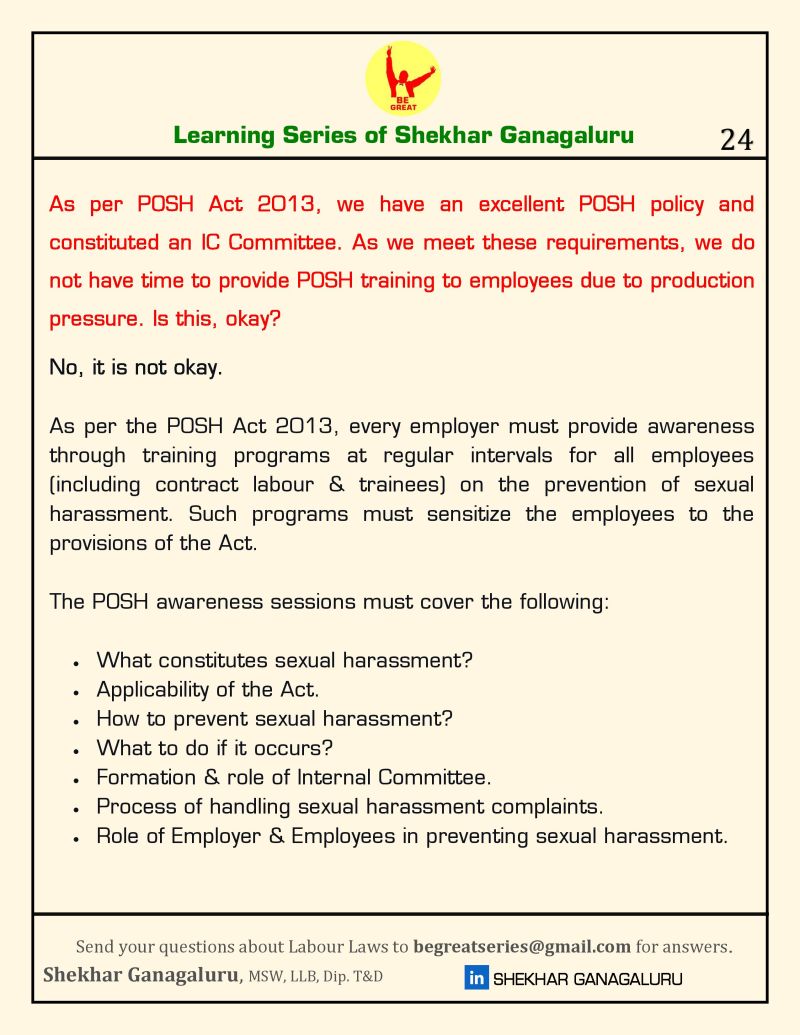
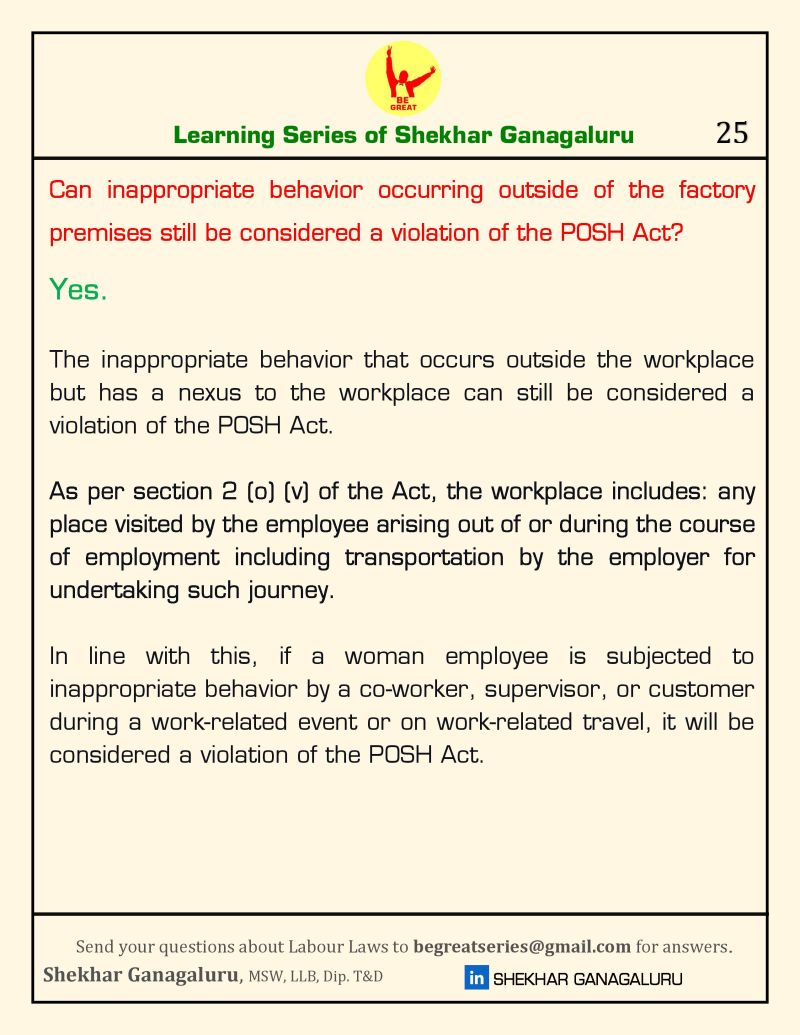
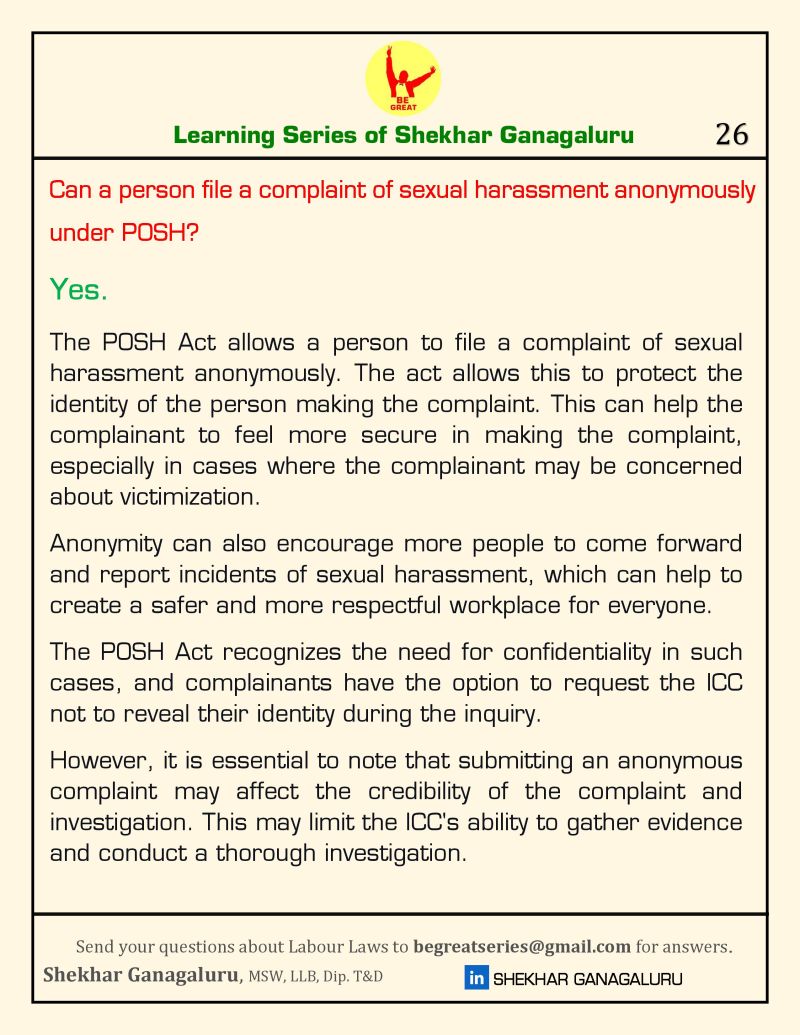
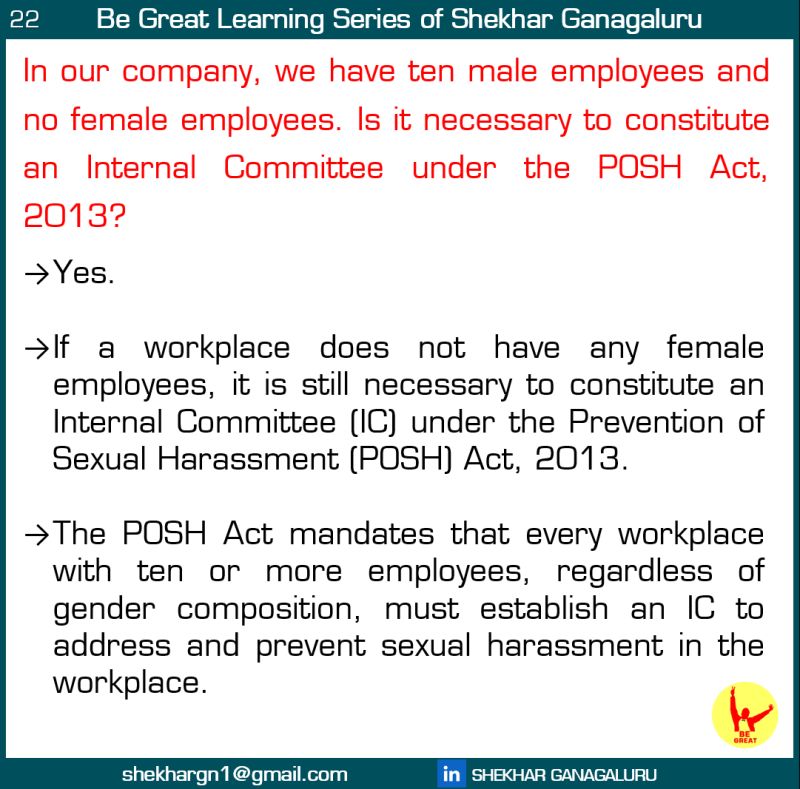
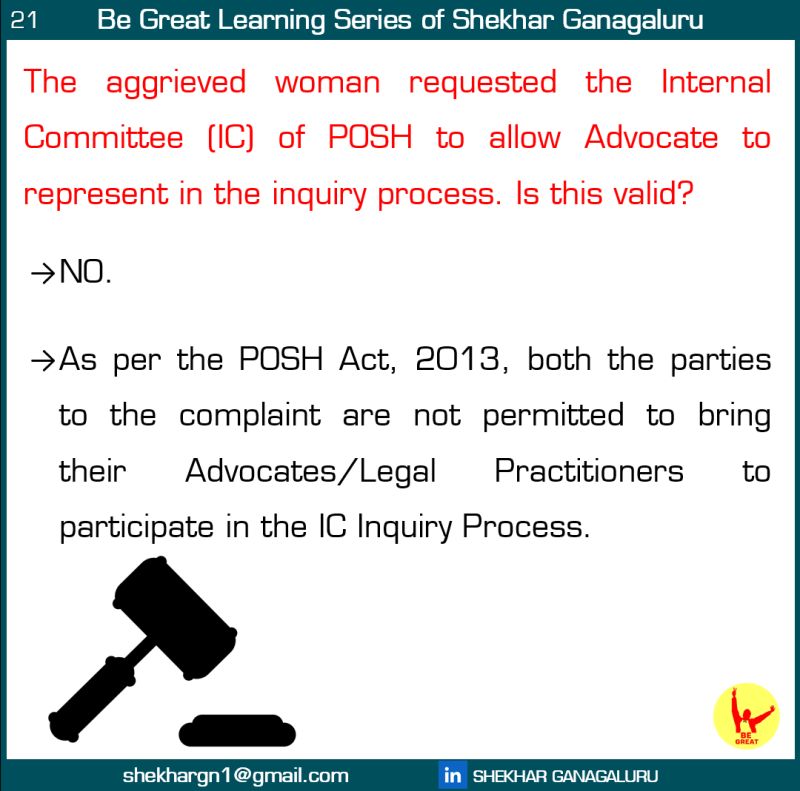
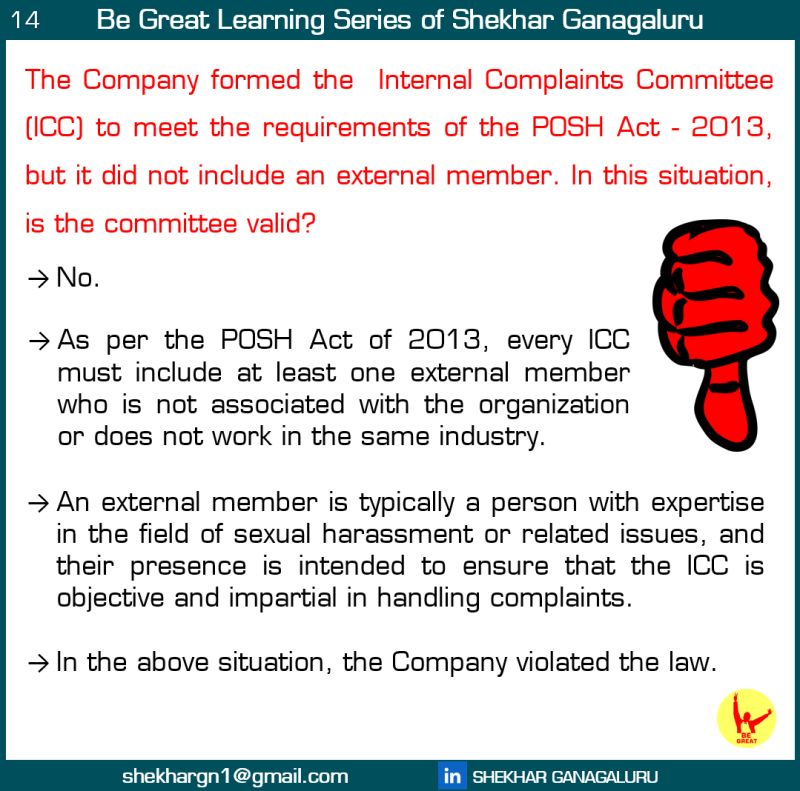

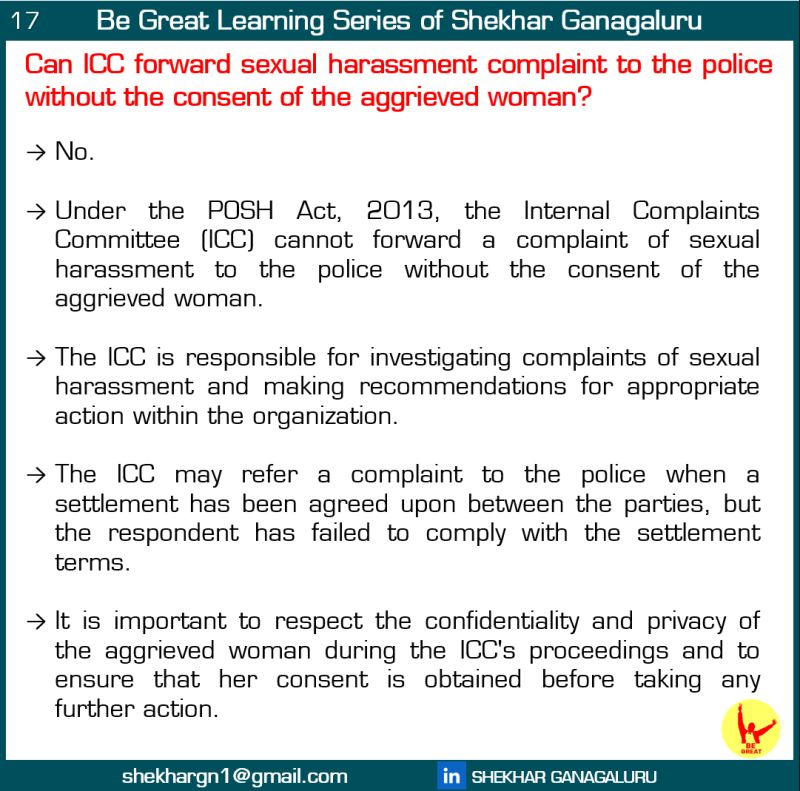
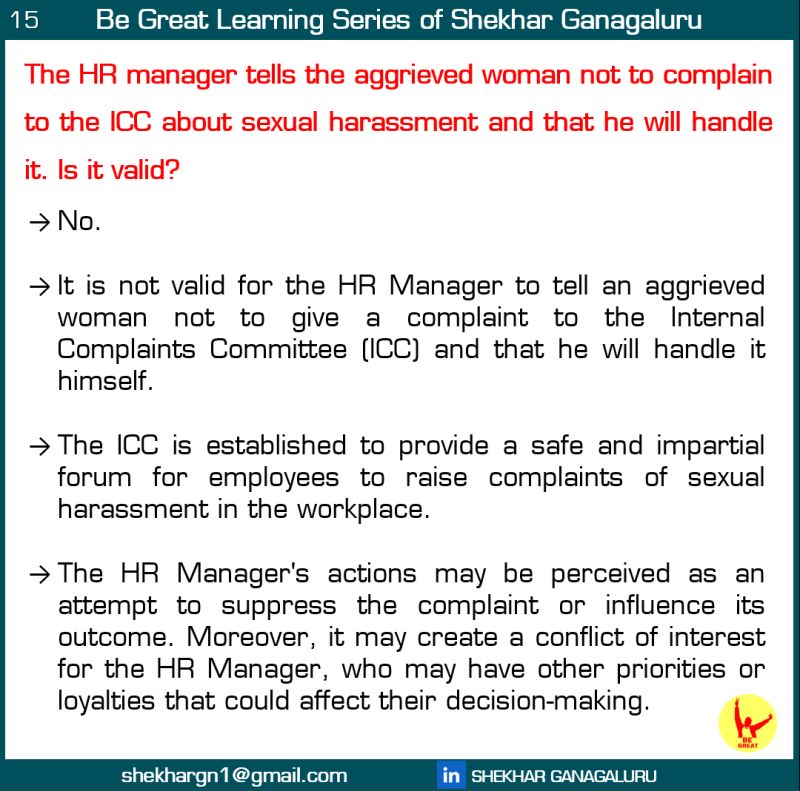
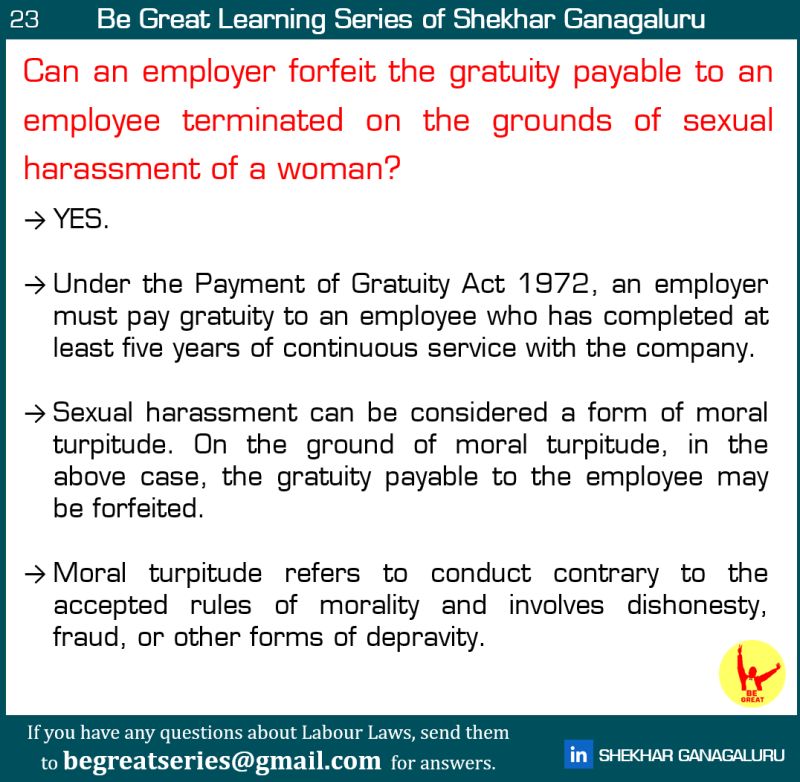
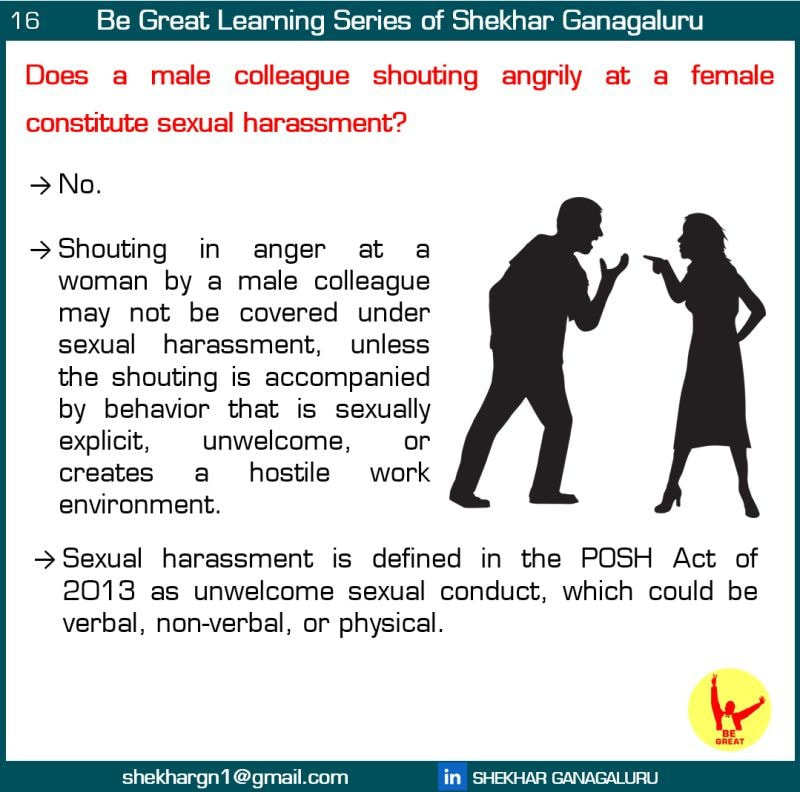








 RSS Feed
RSS Feed





